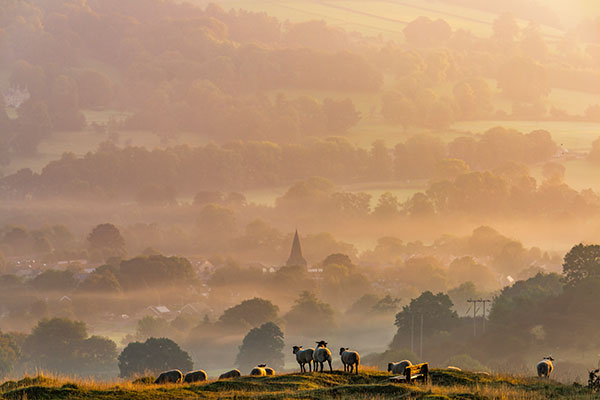As I write, the flood waters are receding on my farm. We got off lightly compared to others round here. Our main rivers – the Severn, Wye, Monnow and Usk – have risen to unprecedented levels this week.
This is the new climate reality. More extreme and more frequent weather events overwhelm the protections that have worked for the past couple of hundred years. Here, Storm Ciara, followed within days by Storm Dennis, pushed river defences up to and then past their limits.
Often, when I talk to people about the adaptations that countries will need to make to respond to a changing climate, they think of the small island nations, or Bangladesh, or Sub Saharan Africa, where the extreme effects are likely to befelt most devastatingly. But here in the UK, we have our own increasingly urgent climate adaptation challenge to manage.
Around the UK, we have quite sensibly built our settlements around sources of water – for agriculture, for transport and for industry. Old and local knowledge helped determinethe safe places to build, or the structures that could survive inundations. But we have lost respect for that local knowledge or assumed that our modern techniques will be enough to manage the risks. It’s why housing estates have been built on flood plains, and woodlands cleared for agriculture. We have lost our capacity to see and respect the way water catchments work. We have sown a wind, and we are now reaping the whirlwind.
Fairbourne in North Wales is the first community in the UK which has been told that its local Council can no longer afford to protect it from the sea. This harsh and serious prospect presages the realities for other communities around the UK – from North Norfolk, to the Somerset Levels, from the Wye Valley to the Calder Valley – even, perhaps, South London. We can’t avoid these discussions any longer. It’s not just the potentially devastating impacts on people’s lives; this will have an ever-increasing impact on risk in the insurance markets, the property markets, the pensions and savings market, and so on…
In recent years, land use conversations have coalesced around farming and food production: how and where our food is produced, and whether or not that same land could be used better for climate and nature. The arguments have become increasingly toxic and polarised. People with strong views lock horns with people with strong links to their place or profession. This is also part of the debates we need: more land sparing, for nature-based solutions, or land-sharing, where sensitively planned multi-functionality can meet many needs?
The UK is starting to work out how we’ll invest in our natural infrastructure and long-term climate change mitigation and adaptation, partly through replacing the common agricultural policy with the new Environment Land Management schemes. But this can’t be just for Defra to deal with. We need a cross-department, joined up and interconnected view. Presently, policy makers are easily seduced by the big and glamorous policies and infrastructure projects – HS2 springs to mind. But the far-reaching adaptations we will need to make in communities around the country are arguably even more important, though less amenable to a photo opportunity…
A whole system, properly debated, evidence led, negotiated, top down and bottom up land use framework for the UK will help bring together all the interests and institutions that have to have a say in this; from environment and farming, town planning and housing, public services, transport and infrastructure, and business investment. And then crucially, it must also work with people in their communities to begin the process of anticipating the impacts of changes in climate and nature, mapping the assets and the resources they have and making plans, both shaping a national framework and informed by it. In the past, such suggestions have foundered on the absence of a good enough consensus. But through the FFCC inquiries, we heard more and more people and institutions calling for this, and it is why it featured centrally in our recommendations.
Such a process may test relationships between the four home nations. Environment, farming and health policies, for example, are all devolved, and increasingly define the diverging aspirations of each country. Scotland and Wales are making progress on their own big ‘land’ based questions. In truth, it is England that is falling behind. And yet river catchments do not respect national boundaries, as the Wye proves this week, on its journey from Wales, through England, and back into Wales. Climate change is here; and we must all take it seriously. A land use framework would be the start of a plan commensurate with the scale of the task ahead. Our inquiry tells us the consensus is now behind it.
Read RSA Food, Farming and Countryside Commission paper, 'A framework for sustainable land use'
Read Our Future in the Land and Field Guide for the Future.
Related articles
-
Finding the road to renewal
Sue Pritchard
New poll by FFCC and the Food Foundation finds 85% of people want to see some of the personal or social changes they have experienced during Covid-19 continue afterwards, whilst just 9% want everything to go back to how it was before the pandemic.
-
Counting on recovery: collecting the data to inform policy post-crisis
Tom MacMillan
We’re starting to gather evidence on community responses to the pandemic, to help shape post-crisis policy. If you are too, let’s team up.
-
The Future is Here
Sue Pritchard
In a rapidly changing world, we need a stubborn optimism for the future.



Join the discussion
Comments
Please login to post a comment or reply
Don't have an account? Click here to register.
Indeed we have lost respect for our traditional and local knowledge - such knowledge was based on practical experience. So how can we re-respect such local knowledge and management systems to help us cope with climate (and Covid) uncertainty. Our for-bearers coped with uncertainty - how? and how can this help us cope with more severe floods or droughts. We can learn from and adapt such experiential knowledge systems to help us cope with present day risks. Here "scientific" knowledge and traditional knowledge should be (can be) mutually supportive to help us cope
Yes well said , undoubtedly the time is over due to have a open minded & wide ranging conversation on this very topic but are our politicians or political system up to the job up to it ?
Undoubtedly there will be winners & losers in any meaningful fresh proposals. When the BIG things that need to be done are first contemplated there will be an outcry.
If the ostriches ever take their heads out of the sand , it is actually pretty obvious what sort of action is required.
For a start the moors & uplands all need to be re-planted with trees that is their natural(before man) state. More lowland needs to be re-forested too that is it's natural (before man) state. This would MASSIVELY reduce flooding problems. This is a relatively cheap option cash wise but an expensive solution politically .
Rising sea levels will be a even harder challenge to meet both in cash & politically, much to the surprise of modern attitudes nature is a powerful force & the most modern technology will not offer any meaningful long term solutions - in other words we can't play king Canute against the rising tides. We will have to retreat to higher ground. OK. that's BIG ! but we have no choice.
After all this turmoiI I just hope the politicians have the foresight to prioritise domestic food supply farming as the very first priority. if they even survive the mauling from the losers ! These days in our highly artificialized way of life we have quite forgot the absolute necessity of our daily bread. Challenging times indeed.
Do they dare to have this whole conversation ? Can they act fast enough ? Hmm………….